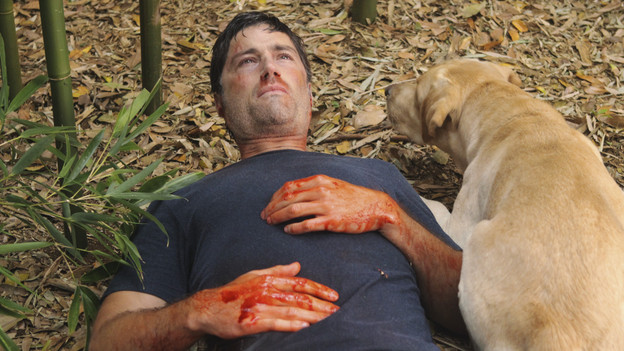Some brief thoughts on the series finale of Lost coming up just as soon as I re-read Cat's Cradle

Before I start reading other reactions on the internets, I can't help but feel both satisfied and disappointed. On the one hand, this was a very good episode of Lost, with beautiful visuals and a wonderfully lyrical score.
But ultimately, what was the point of the sideways universe? It seems like it was just there to enable the producers to bring back actors whose characters died and let the doomed and fated couples be happy together. Is nostalgia for the first and most-watched season of the show a compelling enough story t occupy the final season of the show?
Lost is Jack's journey, from the time he wakes up on the Island until he does something in some cave of glowy light. Jack finds his faith and saves the Island. But the sideways world was only there because Jack was getting ready to die?
Are all these people together in the sideways world because they are all Bokonists and this is their karass? It is no surprise that the writers of Lost would be Vonnegut fans -- after all, Desmond already became unstuck in time, ala Billy Pilgrim.
In Bokonism, a karass is a group of people a group of people who, often unknowingly, are working together to do God's will. The survivors of the cash of 815 were working together, often unknowingly and unintentionally to save the glowy light at the center of the Island, whatever it is. So it goes.
So it was nice to bring all of the gang back together, but for what purpose?
And if the purpose of the sideways universe was for all of its denizens to wake up to the fact that they died in the real world and be ready to move on together to another life, does that give it purpose for the story of the Island and our characters? Or was it just to bring back characters who had died so that we, the audience, could revisit their time on the Island? Does the show serve a story or is the story crafted to meet the needs of the show?
The one theory about the sideways universe I found the least compelling was the afterlife theory-- that it was the final ending for the characters. And that's probably the closest to what it was. The Island was the real world* and it was what mattered.
*Or was it all Jack's hallucination as he died from the original plane crash? That he concocted a story involving the people he saw with him on the plane and this Island, and then he died? Although he was Mr. Live Together or Die Alone, Jack stubbornly went alone to the cave of glowey mystery to save Desmond and the Island, and then ultimately died alone.
My original theory about the flashes to the sideways world was that the characters in that world would take actions that led them to the same place as in the original world -- that they'd lead themselves to the same ending, or take different actions but for the same reasons, yet would have ended up causing the same results. Even though 815 landed in LAX, the characters still would have found their same love, and Jack would sacrifice his sideways life and his real life to save the world.
But why would it be so bad if the light in the cave of glowey mystery went out? What would be so bad if Smokey made it off of the Island? If the sideways world showed the stakes of Smokey leaving, that might have made the ultimate battle more compelling.
Another theory is that the sideways world was the result of what would happen if Smokey got off the island, and that things there would end up badly-- if not for our characters, than for everyone. With the actual story, what were the stakes to the battle for the Island? Do we have any evidence that if Smokey got off the Island, it would be terrible?
Ultimately, like the six seasons of the show, the finale is a mixed bag. There's some great character interactions. There are some great set pieces. It looks beautiful. The score gives the show more emotional heft than some of the writing. But there are a tremendous amount of red herrings and narrative dead ends.
But this is the definitive ending of the show? I would watch a spinoff about the Hurley and Ben administration of the Island.
Around the web
For most viewers, watching Lost may have been less enjoyable than discussing Lost. And with the finale having a mix of elements that I loved with elements that didn't work at all for me, I'm more interested in reading other opinions than with some other series finales. With other divisive finales, such as The Sopranos, BSG, The Wire, I had a more solid opinion of how I felt about the endings. "The End" is such a mixed bag that it may be too soon to form a fully consistent opinion. Links are ordered in order by how much they reflect my opinion, starting from the most consistent:
Noel Murray, The AV Club, “The End”: "And the verdict? “Hell yeah” streaked with a lot of “ah well.” (Along with a little, “Hell? Yeah.”). Because with Lost, there’s always a closely intertwined duality—even in the reactions."
Jace Lacob, Televisionary, See You in Another Life: Thoughts on The Series Finale of Lost "My frustration with the series finale may have been the fact with how the Lost-X timeline--or lack thereof--was presented, introduced in the final season and glimmering with possibility of how it directly connected to the narrative we'd seen unfold over the five previous seasons, the island trapped at the bottom of the sea. By revealing it to have been ethereally connected, it removed much of the drama that had been contained in that storyline. What did it really matter if Jack had a child there or Kate proclaimed her innocence or Locke was confined in a wheelchair once more, if none of it was 'real'?"
Alan Sepinwall, Hitfix, 'The End': See you in the other life, brother: "Of course, those are two extremist views of 'Lost' - all plot vs. all character - and I suspect most of you fall, like me, somewhere in between. And because of that, I'm still wrestling with my feelings about 'The End'… Ultimately, 'Lost' didn't succeed because of the mythology. We've seen too many examples of mythology-heavy, character-light series fail over the last six years to think that. 'Lost' succeeded on emotion, whether that emotion was fear of the monster in the jungle, or grief over Juliet dying, or joy at Desmond reuniting with Penny, or thrills at Sayid's breakdance fighting and Hurley riding to the rescue in the Dharma bus. When 'Lost' was really and truly great, it locked you so deep into the emotions of the moment that the larger questions didn't really matter."
James Poniewozik, Time, Lostwatch: All of This Matters: "I guessed about halfway into the episode that Jack would not survive it. This is no work of genius on my part. In a way, the ending was almost so perfect that it's amazing we didn't all call it. Certainly people have guessed that the series that began with Jack's eye opening would end with it closing. And it made perfect sense that Jack, who was meant to die at the end of the original version of the Lost pilot, instead die at the end of the series."
Maureen Ryan, Chicago Tribune, The 'Lost' finale: It's hard to let go: "So, here's how the finale landed for me: The emotional part of the finale worked so well that I don't care much about the analytical/structural stuff."
Todd VanDerWerff, Los Angeles Times, If you come with me, I'll show you what I mean "'The End' chose not to tie up loose ends or make the mythology entirely make sense. It decided not to make more specific just why the Monster couldn't leave the Island or why the Island had to exist for the rest of the world to go on as it is (at least, that's how I'm interpreting the idea that the Island's heart going out would mean the end of everything). It probably figured that vague notions in these regards were all we needed."
Tom & Lorenzo, Lost: The End, "What absolutely floored us, however, were the last 15 minutes, which left us sitting in our chairs for at least an hour after the show ended staring off into the distance and occasionally uttering a surprised 'Oh,' or 'Well...that happened.' Despite whatever misgivings we may have about it, that we had that kind of reaction means the ending was an entirely appropriate one for this show."
Myles McNutt, Cultural Learnings, Series Finale: Lost – “The End”, "All of this matters, for better or for worse, and by wearing its heart and soul on its sleeve Lost has gone out the same way it came in: presenting a very big world with some very big ideas through the eye(s) of those who live their lives within it."

This is a test. This is only a test. 4 8 15 16 23 42